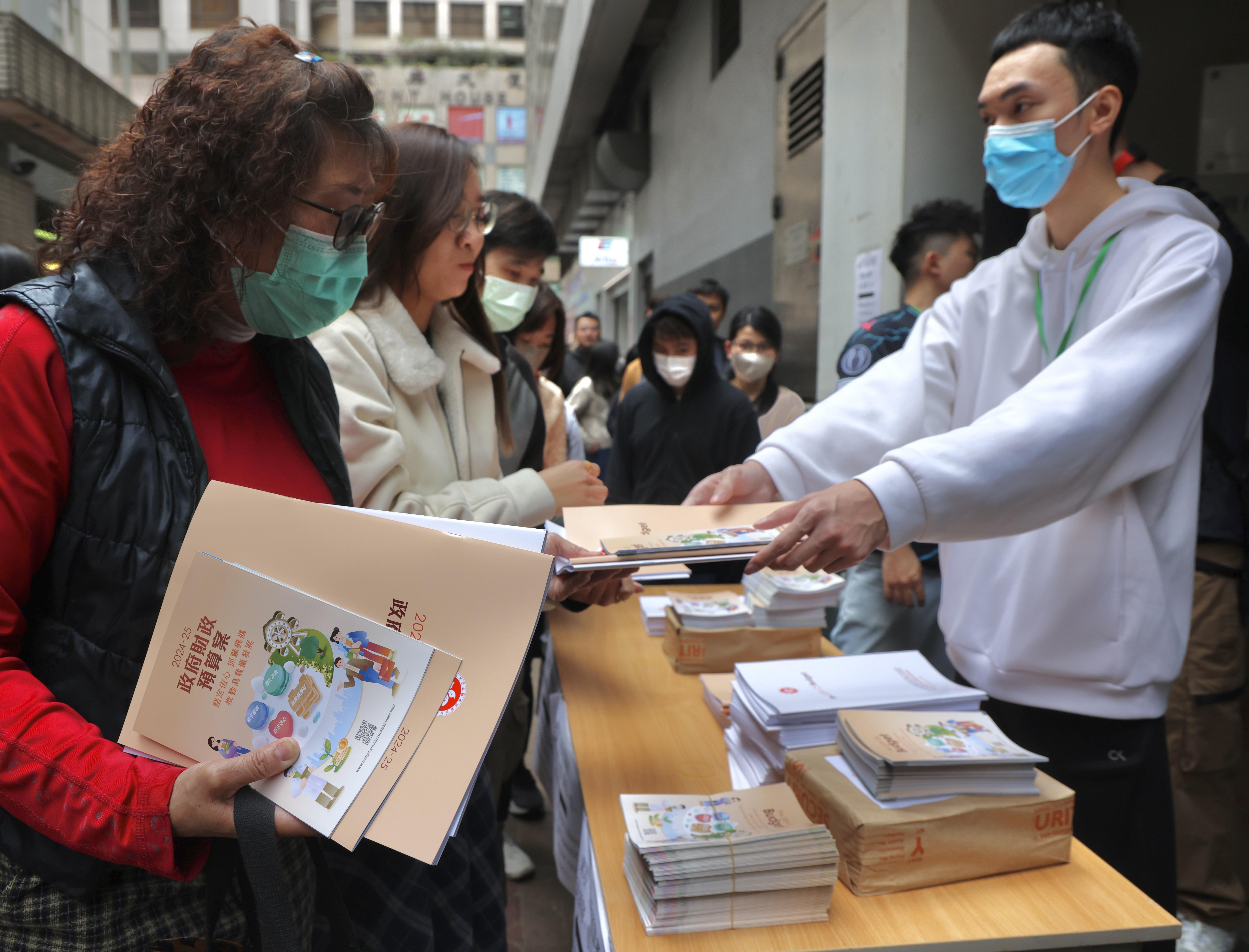 Financial Secretary Paul Chan Mo-po (second left) and Secretary for Financial Services and the Treasury Christopher Hui Ching-yu (second right) listen to questions from the media during a press conference on the 2024-2025 Budget at the Central Government Office on Feb 28, 2024. (CALVIN NG / CHINA DAILY)
Financial Secretary Paul Chan Mo-po (second left) and Secretary for Financial Services and the Treasury Christopher Hui Ching-yu (second right) listen to questions from the media during a press conference on the 2024-2025 Budget at the Central Government Office on Feb 28, 2024. (CALVIN NG / CHINA DAILY)
Removing all property cooling measures and easing mortgage rules could breathe new life into Hong Kong’s housing market by stimulating transactions and liquidity, experts have said, describing the move as essential for the city’s recovery.
Home transaction volumes are expected to rise by more than 30 percent this year as the full elimination of property curbs will lure prospective buyers back to the market, according to Willy Liu Wai-keung, CEO of Ricacorp Properties.
The government’s move can “allow the property market to naturally adjust”, Liu said, adding that transaction volumes will return to a healthier level, which will be beneficial for the overall development of the property market.
Jubilation came as Financial Secretary Paul Chan Mo-po on Wednesday announced in his budget speech the decision to cancel decade-old property curbs, namely, Buyer’s Stamp Duty which targets non-permanent residents, New Residential Stamp Duty for second-time purchasers, and Special Stamp Duty
Jubilation came as Financial Secretary Paul Chan Mo-po on Wednesday announced in his budget speech the decision to cancel decade-old property curbs, namely, Buyer’s Stamp Duty which targets non-permanent residents, New Residential Stamp Duty for second-time purchasers, and Special Stamp Duty.
ALSO READ: Chan scraps HK property curbs, moots 2-tier personal tax model
Meanwhile, the Hong Kong Monetary Authority eased mortgage rules, suspending stress tests and allowing some home buyers to make purchases with a smaller down payment.
“We expect the cancellation of all demand-side management measures for residential properties to bring a positive impact to the transaction volume with sentiment turned positive gradually,” said Eddie Kwok, senior director of Valuation & Advisory Services at CBRE Hong Kong, a real estate consultancy.
In addition, HKMA’s pause in the interest rate stress testing requirement will reduce buyer’s entry costs, which could also revitalize residential transactions, Kwok added.
The property demand-side curbs, also known as “spicy measures”, were first introduced in 2010 to rein in the city’s hot housing prices. However, under pressure from rising borrowing costs and a sluggish economy, the property market has struggled to cope with a downward spiral in recent years.
ALSO READ: CE says budget proposes concrete measures
According to the finance chief, flat prices fell 7 percent last year, while the number of transactions declined by 5 percent to a low level of about 43,000.
 Hong Kong residents queue up at a stand outside the Home Affairs Enquiry Centre in Wan Chai, Hong Kong, to get hard copies of the financial secretary’s budget speech on Feb 28, 2024. (EDMOND TANG / CHINA DAILY)
Hong Kong residents queue up at a stand outside the Home Affairs Enquiry Centre in Wan Chai, Hong Kong, to get hard copies of the financial secretary’s budget speech on Feb 28, 2024. (EDMOND TANG / CHINA DAILY)
The government rolled back some measures last October, halving both the 15 percent levy for second home buyers and non-citizens to 7.5 percent.
Nevertheless, even with a full removal this time, Ryan Ip, vice-president of the think tank Our Hong Kong Foundation, said it might only improve the market sentiment “to a certain extent”.
READ MORE: Lifting of HK home curbs greeted with general approval
Ip said the move cannot fully control the fluctuations of the property market, while the future market trend will depend on changes in interest rates, the economic outlook, the supply landscape, the external environment and other factors.
 A property agency in Hong Kong puts up a poster welcoming government measures to scrap all property cooling measures on Feb 28, 2024. (EDMOND TANG / CHINA DAILY)
A property agency in Hong Kong puts up a poster welcoming government measures to scrap all property cooling measures on Feb 28, 2024. (EDMOND TANG / CHINA DAILY)
Among the government’s accelerated efforts to create favorable conditions for recovery, the city also aims to boost its capital market. Much-anticipated initiatives including introducing a treasury share buy-back regime and maintaining trading operations under severe weather conditions should be implemented by the middle of the year.
Hong Kong Exchanges and Clearing (HKEX) on Wednesday hailed the finance chief’s plans, saying it will further elevate the city’s competitiveness as an international financial center.
“We are developing more initiatives that will enhance liquidity and efficiency, making Hong Kong’s markets even more attractive to issuers and investors, whilst also ensuring the long-term success for our business and our community,” said HKEX Chief Executive Officer Nicolas Aguzin.


